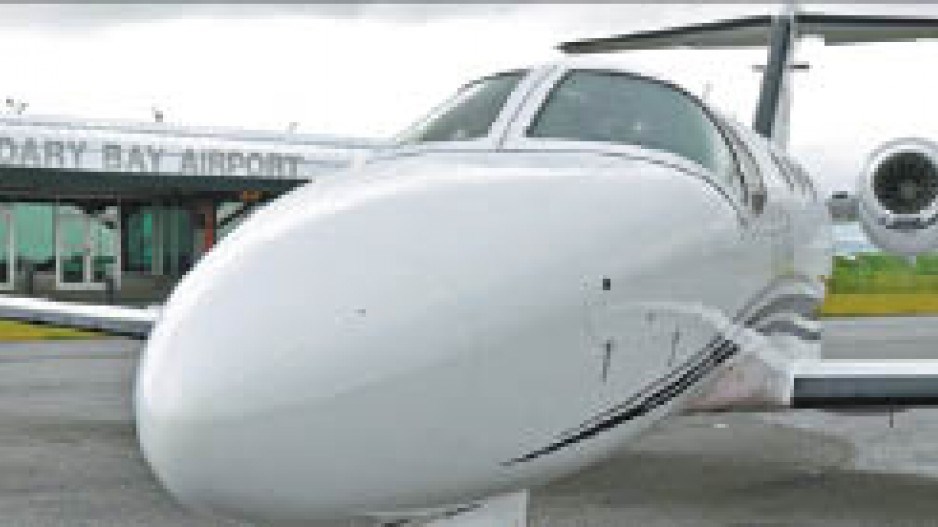A spectre from Boundary Bay Airport’s troubled past has re-emerged, creating a potential threat to its bottom line.
Seven years ago, Alpha Aviation entered into a long-term lease with the Corp. of Delta to operate the airport.
Since then, the company has built a new terminal at Boundary Bay, updated its heritage hangar and improved local infrastructure to help existing businesses and attract new ones.
But in July, the airport’s former leaseholder, Boundary Bay Airport Corp., filed suit against Alpha in B.C. Supreme Court seeking $950,000 for an alleged breach of the lease purchase agreement.
The suit, filed on behalf of a numbered company, claimed Alpha owed the former leaseholder $500,000 for a lease extension with Delta.
It further alleged that Alpha aviation should pay the former leaseholder another $450,000 for an additional 10 acres of commercial development space Alpha took over since the original 2004 agreement was signed.
But Alpha general manager Greg Fong isn’t worried about the suit, even though his company has yet to generate profit at the airport.
“We’re dealing with it, but we don’t anticipate it’s going to be a major problem,” said Fong.
On September 8, Alpha filed a response to the notice of claim, arguing it doesn’t owe any money to the former leaseholder.
According to court documents, Alpha furthered alleged that it incurred “massive costs and expenses” arising from the leaseholder’s failure to comply with the lease when it operated the airport.
In addition to the lease purchase price, Alpha claimed it spent more than $3 million repairing and upgrading the airport.
Since 2004, Fong said Alpha has invested more than $24 million at Boundary Bay.
The former leaseholder’s lawyer could not be reached for comment, but Fong confirmed the suit is related to former Boundary Bay Airport Corp. president Isy Rogowski.
In 2003, a B.C. Supreme Court judge awarded Delta full control of the airport after Rogowski failed to pay $1.4 million in property taxes.
Fong wouldn’t comment further on the suit.
Tenants at Boundary Bay Airport say although Alpha has yet to turn a profit, they’re happy with the airport since the company took over in 2004.
“It’s brought some solidity to the operating environment out here,” said Pat Kennedy, COO of the Pacific Flying Club.
In addition to significant upgrades at the airport, Alpha has also been working with Delta, Port Metro Vancouver and the local business community to attract new development.
Delta council recently endorsed an extension of Alpha’s airport lease to 2099, along with a master-servicing plan that would improve water and sewer infrastructure for tenants.
Delta Coun. Robert Campbell said the lease extension would help Alpha find long-term tenants that were having a hard time acquiring favourable leases from banks that knew Alpha’s operation lease was up in 2050.
“We felt we were able to do that and extend that lease out to a point where Alpha could then say there’s some security for the bank,” said Campbell, who is also chairman of Delta’s Boundary Bay Airport Advisory Committee.
Delta has also agreed to front-end the cost of water and sewer upgrades, a project expected to cost a “couple million dollars.”
On top of that, Ottawa, the province, Delta and Port Metro Vancouver have partnered on a $20 million upgrade of the 80 Street Overpass.
The project, which is part of the Roberts Bank Rail Corridor program, will improve access to the airport.
Fong said the improvement would bypass railroad tracks where long freight trains have impeded road access to the airport.
The project is expected to be complete next year, and Campbell believes it will help the airport market its industrial land, which can be developed for aviation and light industrial uses.
“You look at how much industrial land there is in the Lower Mainland, there’s not a heck of a lot,” said Campbell, “and we believe … Boundary Bay is extremely important to the economic viability of the community.”
Development at the airport is also good news for Delta. Thanks to major tenants such as Heli-One, BC Fresh and a host of flight schools, Boundary Bay now generates more than $1 million in tax revenue per year compared with $140,000 in 2004. •




